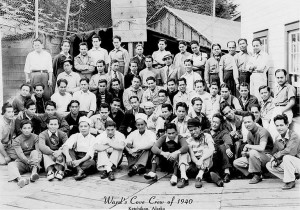
Filipino workers (1940) at Wards Cove Cannery in the ’60s filed a discrimination suit that changed civil rights legislation. UNIVERSITY OF WASHINGTON LIBRARY
CHICAGO— A Filipino American lawyers’ group will reenact a landmark Filipino and Alaskan salmon cannery workers’ workplace discrimination case that was argued before the U.S. Supreme Court in 1989 and led to amendments in Title VII of the Civil Rights Act of 1991.
The reenactment, “Justice Denied: Wards Cove Packing Co. V. Atonio,” will be presented on Thursday, Oct. 27 at the Loyola University Chicago School of Law’s Phillip H. Corboy Center.
The Filipino American Lawyers Association (FALA) of Chicago and the Loyola University Chicago School of Law’s Asian Pacific American Law Students Association are presenting this event in honor of Filipino American History Month.
The script draws on actual transcripts from court proceedings and will be dramatized by an ensemble of law students, community leaders, and distinguished members of the judiciary.
Additionally, the program will feature insights from an original plaintiff in one of the companion cases to the Wards Cove litigation.
The court deliberations stated that jobs at the canneries wee of two general types: “cannery jobs” on the cannery line, which were unskilled positions; and “non-cannery jobs,” which fell into a variety of classifications. Most non-cannery jobs were classified as skilled positions.
Cannery jobs were filled predominantly by non-whites: Filipinos and Alaska Natives. The Filipinos were hired through, and dispatched by, Local 37 of the International Longshoremen’s and Warehousemen’s Union pursuant to a hiring hall agreement with the local. The Alaska Natives primarily resided in villages near the remote cannery locations.
Non-cannery jobs were filled with predominantly white workers, who were hired during the winter months from the companies’ offices in Washington and Oregon. Virtually all of the non-cannery jobs paid more than cannery positions. The predominantly white non-cannery workers and the predominantly non-white cannery employees lived in separate dormitories and ate in separate mess halls.
U.S. Supreme Court Justice Byron White in his 1989 majority opinion wrote, “[it is] an unfair employment practice for an employer to discriminate against any individual with respect to hiring or the terms and condition of employment because of such individual’s race, color, religion, sex, or national origin; (O)r to limit, segregate, or classify his employees in ways that would adversely affect any employee because of the employee’s race, color, religion, sex, or national origin.”
Voting with him were Chief Justice William Rehnquist, Justices Sandra O’Connor, Antonin Scalia, and Anthony Kennedy.
Attendance is complimentary but space is limited. Advance registration is required via HTTP//WardsCove.Eventbrite.com. Light refreshment will be provided. Continuing Law Education credit is available. Reception starts at 5:30 pm and program at 6:30 pm.
The presentation will be at the Loyola University School of Law’s Power Rogers & Smith Ceremonial Courtroom, 25 E. Pearson St., 10th Floor, Chicago, Illinois 60611.